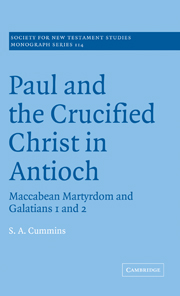Book contents
- Frontmatter
- Contents
- Preface
- List of abbreviations
- Introduction
- Part One MACCABEAN MARTYRDOM
- 1 Maccabean martyrdom: formative texts and traditions
- 2 Maccabean martyrdom in first-century Judaism and Paul
- Part Two PAUL AND THE CRUCIFIED CHRIST IN ANTIOCH
- Conclusion
- Bibliography
- Index of passages
- Select index of Greek words and phrases
- Index of modern authors
- Select index of names and subjects
2 - Maccabean martyrdom in first-century Judaism and Paul
Published online by Cambridge University Press: 22 September 2009
- Frontmatter
- Contents
- Preface
- List of abbreviations
- Introduction
- Part One MACCABEAN MARTYRDOM
- 1 Maccabean martyrdom: formative texts and traditions
- 2 Maccabean martyrdom in first-century Judaism and Paul
- Part Two PAUL AND THE CRUCIFIED CHRIST IN ANTIOCH
- Conclusion
- Bibliography
- Index of passages
- Select index of Greek words and phrases
- Index of modern authors
- Select index of names and subjects
Summary
Given the traumatic nature of Antiochus IV Epiphanes' assault upon the Jewish way of life, and the dramatic deliverance brought about by the Maccabean revolt, it should occasion little surprise that such events lived on in the memories of later generations. Indeed, the analysis in chapter one has already intimated as much. However, the significance of this fact has not always received the consideration it deserves. Thus, while recognizing the multifarious nature of Second Temple Judaism, the intent of this chapter is to establish that the Maccabean period – and not least the pivotal role of its martyr figures – was current as an inspirational living tradition readily at hand to a first-century Jew such as Paul.
This task will be undertaken by summoning three complementary classes of evidence. First, by reference to the work of Farmer, Hengel and Wright, it will be argued that there is a discernible religio-political continuity between the Maccabean movement and first-century Jewish nationalist aspirations, and that at least some members of the Pharisaic movement (including Paul) may be located in close proximity thereto. A sharp focus upon this wider context will also be provided by means of an examination of the Jewish response to the Caligula Temple edict. This incident evoked painful memories of the Maccabean crisis and its impact may also be traceable in the early Jewish Christian community.
- Type
- Chapter
- Information
- Paul and the Crucified Christ in AntiochMaccabean Martyrdom and Galatians 1 and 2, pp. 54 - 90Publisher: Cambridge University PressPrint publication year: 2001



